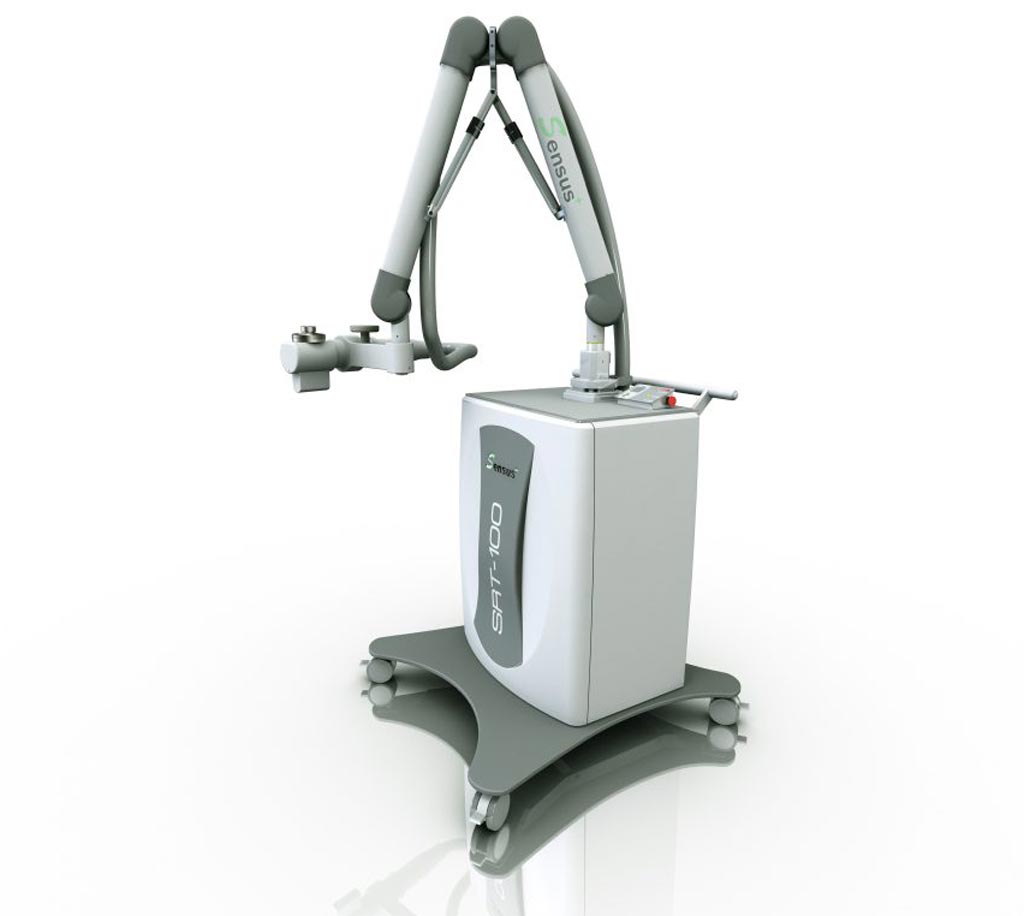Superficial Radiation System Treats Keloid Scars
By MedImaging International staff writers
Posted on 13 Dec 2018
A novel image-guided superficial radiation therapy (SRT) system offers a non-invasive, painless option for treating keloid scars.Posted on 13 Dec 2018
The Sensus Healthcare (Boca Raton, FL, USA) SRT-100+ is a complete, stand-alone, x-ray radiation therapy (RT) system intended for SRT of oncological and non-oncological skin conditions, including primary malignant epithelial neoplasms of the skin and keloids. The system consists of two major separate components; a control console that was specifically designed to house the switches and indicators used by the operator to set up and execute x-ray exposures, but without treatment planning capability; and the base unit.

Image: Precise surface x-ray emissions target scar tissue (Image courtesy of Sensus Healthcare).
The base unit consists of a cabinet containing a high voltage generator, power supply components, a cooling system, and a positioning mechanism on which the SRT x-ray tube housing assembly is mounted. The system also includes a series of applicators designed to be affixed to the x-ray port, which limit the x-ray beam spread and provide a fixed source-to-skin distance (SSD). The X-ray tube housing assembly also contains a motorized filter mechanism, which moves the appropriate beam filter into the beam path, depending on the kV setting selected.
The system produces and emits filtered, low energy (50, 70, and 100 kV) x-ray radiation, electrically generated using a conventional ceramic x-ray tube, which is confined to the specified treatment field. To mitigate the effects of the ionizing radiation on healthy cells, and to accumulate more damage in the neoplastic cells and fibrous keloid cells associated with scar tissue, the total dose is fractionated over a period of time, with remote diagnostics and operation tracking.
“Sensus is committed to constantly innovating and creating solutions that are truly life-changing for people all over the world, and we have listened closely to both doctor and patient feedback to create the sophisticated SRT-100+ to ensure patient safety and comfort,” said Joe Sardano, CEO of Sensus Healthcare. “Keloids are very common and can develop in any place where trauma occurs, especially after surgery. Both doctors and patients need an effective solution to treat keloids and keep them away once and for all.”
“Keloids not only have a high recurrence rate, but they also significantly affect a person's confidence and quality of life. As such, our team is constantly looking for better ways to treat patients who are afflicted with keloids in the most non-invasive, painless way possible,” said Kenrick Spence, MD, of Hillcrest Plastic Surgery (Orlando, FL, USA). “We look forward to treating patients with the SRT-100+ and providing an important option for the treatment and prevention of keloids.”
Keloid scars are areas of fibrous tissue that replace normal skin after injury; apart from minor lesions, every wound results in some degree of scarring. The scar tissue is composed of collagen, but the fiber composition is different; instead of the normal, random, basket-weave formation of the collagen fibers found in normal tissue, the collagen cross-links and forms a pronounced alignment in a single direction, which results in inferior functional quality.
Related Links:
Sensus Healthcare














